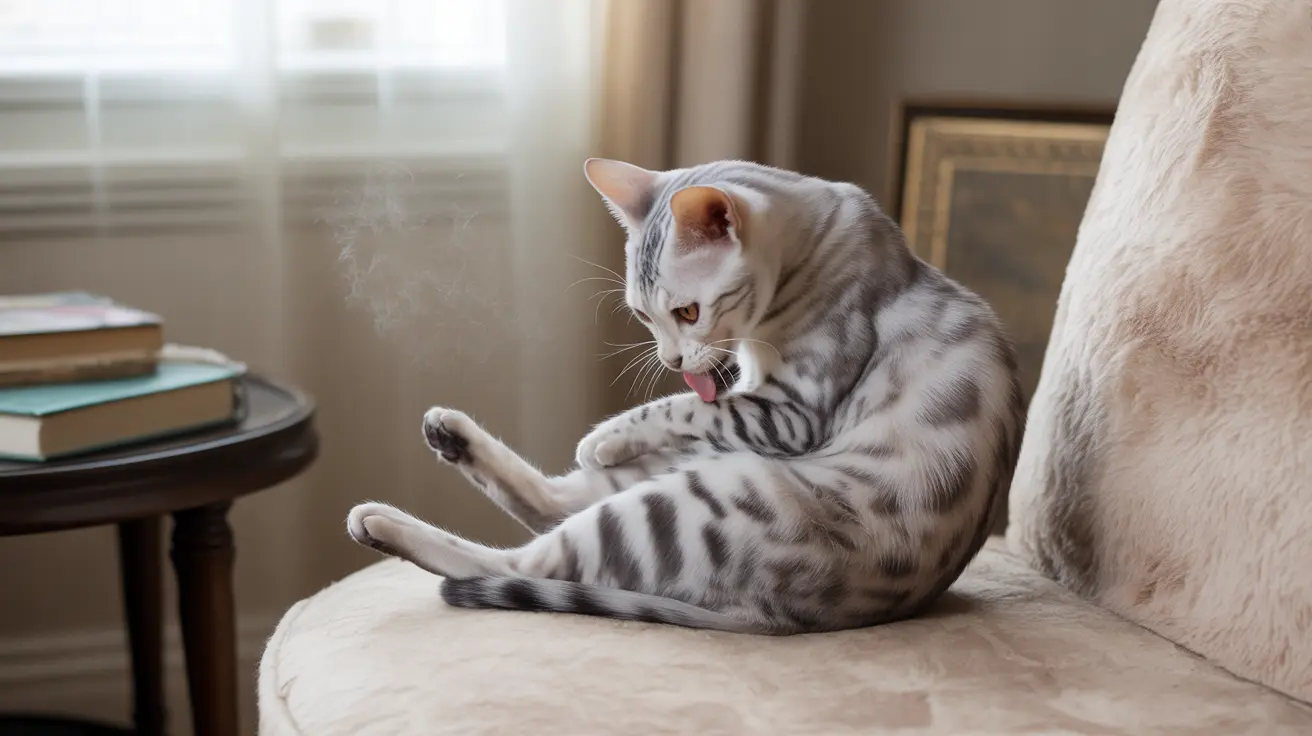If you've noticed your cat licking their belly raw, you're witnessing a concerning behavior called overgrooming. While cats naturally spend up to half their day grooming themselves, excessive licking that leads to hair loss, inflammation, or raw skin indicates an underlying problem that requires attention.
Understanding why cats develop this behavior and how to address it effectively is crucial for your pet's health and wellbeing. Let's explore the causes, symptoms, and solutions for cats that compulsively lick their bellies raw.
Understanding Normal Grooming vs. Problematic Overgrooming
Healthy cats typically spend 30-50% of their waking hours grooming themselves. This natural behavior helps them maintain cleanliness, regulate body temperature, and bond with other cats. However, when grooming becomes excessive and causes physical damage, it's time for concern.
Signs that your cat's grooming has become problematic include:
- Bald patches on the belly or inner thighs
- Red, irritated, or raw skin
- Scabs or open sores
- Increased hairball frequency
- Obsessive licking behaviors, especially during stressful situations
Common Causes of Excessive Belly Licking
Medical Causes
Several health issues can trigger excessive belly licking:
- Allergies (food, environmental, or flea-related)
- Parasitic infections
- Skin infections (bacterial, fungal, or yeast)
- Hormonal imbalances
- Pain from internal conditions
- Urinary tract issues
Behavioral Causes
Psychological factors often contribute to overgrooming:
- Stress and anxiety
- Environmental changes
- Social conflicts with other pets
- Boredom or lack of stimulation
- Compulsive disorders
- Separation anxiety
Diagnosis and Treatment Options
A comprehensive veterinary examination is essential to determine the root cause of your cat's overgrooming. Your vet may perform:
- Skin scrapings and cultures
- Allergy testing
- Blood work
- Physical examination
- Behavioral assessment
Treatment Approaches
Treatment plans typically involve multiple strategies:
- Medical Interventions:
- Antiparasitic medications
- Allergy treatments
- Anti-inflammatory drugs
- Antibiotics for infections
- Behavioral Solutions:
- Environmental enrichment
- Stress reduction techniques
- Pheromone products
- Regular play sessions
Prevention and Long-term Management
Preventing recurrence requires ongoing attention to your cat's physical and emotional needs:
- Maintain regular veterinary check-ups
- Keep a consistent daily routine
- Provide environmental enrichment
- Monitor for early signs of overgrooming
- Address stressors promptly
Frequently Asked Questions
Why is my cat licking its belly raw and how can I tell if it's overgrooming?
Your cat is overgrooming if you notice hair loss, redness, or raw skin on their belly. This behavior often occurs when cats are stressed, experiencing allergies, or dealing with medical issues. Watch for bald patches, skin irritation, and increased grooming frequency.
What medical conditions can cause cats to lick their belly excessively and develop sores?
Common medical causes include allergies, parasites (especially fleas), skin infections, hormonal imbalances, and internal pain. Urinary tract infections and gastrointestinal issues can also trigger excessive belly licking.
How can I help reduce stress-related overgrooming in my cat?
Maintain a consistent routine, provide plenty of environmental enrichment, use calming pheromone products, and ensure your cat has safe spaces. Regular play sessions and attention can also help reduce stress-related behaviors.
When should I take my cat to the vet for belly licking that causes hair loss or raw skin?
Seek veterinary care as soon as you notice hair loss, raw skin, or changes in your cat's grooming behavior. Early intervention is crucial for preventing the development of chronic issues or serious complications.
What treatments are available for cats that lick their belly raw due to allergies or anxiety?
Treatments may include antihistamines or special diets for allergies, anti-anxiety medications for stress, topical treatments for skin irritation, and behavioral modification techniques. Your veterinarian will create a customized treatment plan based on the underlying cause.
Remember, excessive belly licking is your cat's way of communicating that something isn't right. By staying attentive to changes in their grooming behavior and seeking prompt veterinary care when needed, you can help ensure your cat maintains healthy grooming habits and overall wellbeing.






